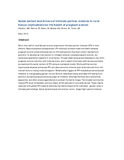Social context and drivers of intimate partner violence in rural Kenya: implications for the health of pregnant women

View/
Date
2013Author
Hatcher, AM
Romito, P
Odero, M
Bukusi, EA
Onono, M
Turan, JM
Type
ArticleLanguage
enMetadata
Show full item recordAbstract
More than half of rural Kenyan women experience intimate partner violence (IPV) in their lifetime. Beyond physical consequences, IPV indirectly worsens maternal health because pregnant women avoid antenatal care or HIV testing when they fear violent reprisal from partners. To develop an intervention to mitigate violence towards pregnant women, we conducted qualitative research in rural Kenya. Through eight focus group discussions, four with pregnant women and four with male partners, and in-depth interviews with service providers, we explored the social context of IPV using an ecological model. We found that women experienced physical and sexual IPV, but also economic violence such as forced exile from the marital home or losing material support. Relationship triggers of IPV included perceived sexual infidelity or transgressing gender norms. Women described hiding antenatal HIV testing from partners, as testing was perceived as a sign of infidelity. Extended families were sometimes supportive, but often encouraged silence to protect the family image. The broader community viewed IPV as an intractable, common issue, which seemed to normalise its use. These results resonate with global IPV research showing that factors beyond the individual - gender roles in intimate partnerships, family dynamics and community norms - shape high rates of violence.
URI
http://www.ncbi.nlm.nih.gov/pubmed/23387300http://erepository.uonbi.ac.ke:8080/xmlui/handle/123456789/32222
Citation
Cult Health Sex. 2013 Apr;15(4):404-19.Collections
- Faculty of Health Sciences (FHS) [10377]
